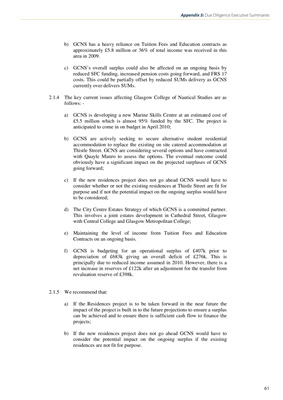
b) GCNS has a heavy reliance on Tuition Fees and Education contracts as
approximately £5.8 million or 36% of total income was received in this
area in 2009.
c) GCNS's overall surplus could also be affected on an ongoing basis by
reduced SFC funding, increased pension costs going forward, and FRS 17
costs. This could be partially offset by reduced SUMs delivery as GCNS
currently over delivers SUMs.
2.1.4 The key current issues affecting Glasgow College of Nautical Studies are as
follows: -
a) GCNS is developing a new Marine Skills Centre at an estimated cost of
£5.5 million which is almost 95% funded by the SFC. The project is
anticipated to come in on budget in April 2010;
b) GCNS are actively seeking to secure alternative student residential
accommodation to replace the existing on site catered accommodation at
Thistle Street. GCNS are considering several options and have contracted
with Quayle Munro to assess the options. The eventual outcome could
obviously have a significant impact on the projected surpluses of GCNS
going forward;
c) If the new residences project does not go ahead GCNS would have to
consider whether or not the existing residences at Thistle Street are fit for
purpose and if not the potential impact on the ongoing surplus would have
to be considered;
d) The City Centre Estates Strategy of which GCNS is a committed partner.
This involves a joint estates development in Cathedral Street, Glasgow
with Central College and Glasgow Metropolitan College;
e) Maintaining the level of income from Tuition Fees and Education
Contracts on an ongoing basis.
f) GCNS is budgeting for an operational surplus of £407k prior to
depreciation of £683k giving an overall deficit of £276k. This is
principally due to reduced income assumed in 2010. However, there is a
net increase in reserves of £122k after an adjustment for the transfer from
revaluation reserve of £398k.
2.1.5 We recommend that:
a) If the Residences project is to be taken forward in the near future the
impact of the project is built in to the future projections to ensure a surplus
can be achieved and to ensure there is sufficient cash flow to finance the
projects;
b) If the new residences project does not go ahead GCNS would have to
consider the potential impact on the ongoing surplus if the existing
residences are not fit for purpose.
61
Appendix 5: Due Diligence Executive Summaries